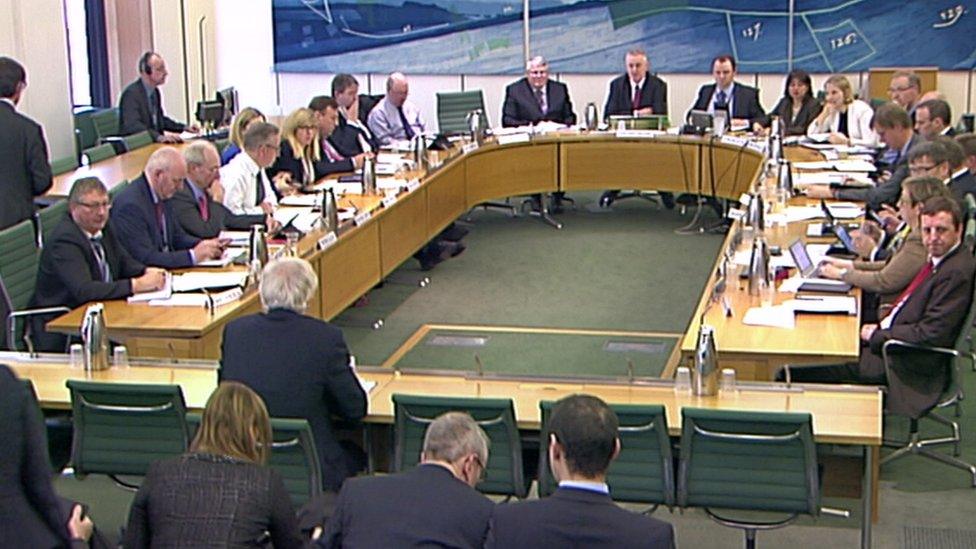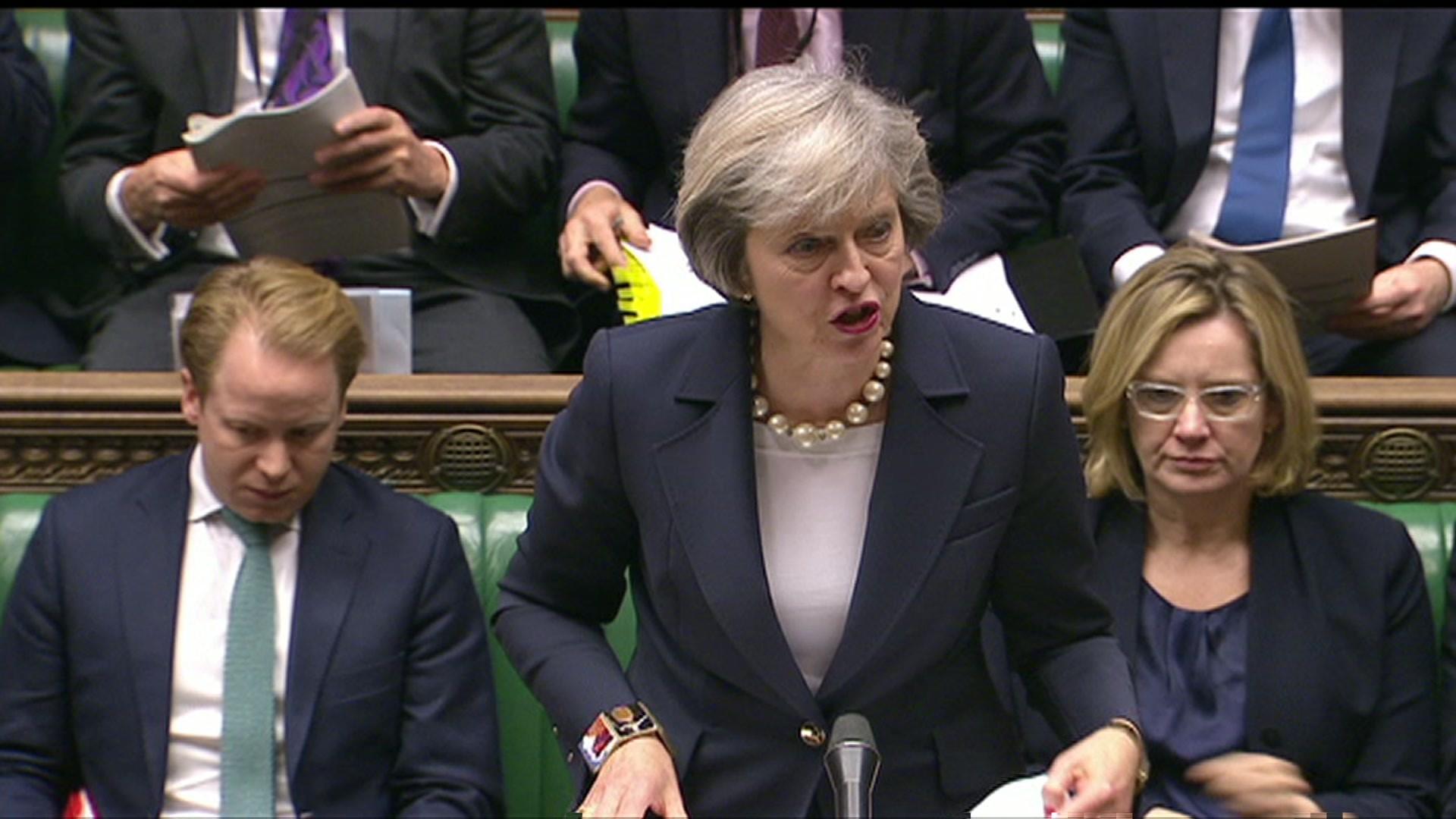David Davis on Brexit: UK's plan still being worked on
- Published

Mr Davis answered questions from MPs for two hours
The government's plan for Brexit negotiations will not be published until February at the earliest.
Brexit Secretary David Davis told MPs there was a lot of research and policy work to be done before it was ready.
Mr Davis said he wanted to be "as open as we can be" without undermining the UK's negotiating position.
The minister also said if no agreement was reached with the EU a transitional Brexit deal could be struck "if it is necessary and only if it is necessary".
The government has said it will notify the EU of its intention to leave - beginning the two year process of talks on its exit - by the end of March at the latest.
In response to pressure from Labour and some Tory MPs, ministers agreed last week to give more detail of their negotiating aims before starting the exit negotiations.
'Smooth and orderly'
Appearing before the Commons Select Brexit committee for the first time, Mr Davis said the "broad outline" of the UK's objectives were known but the detail had to be filled in.
Asked by its chair, Labour MP Hilary Benn, when the plan would be released, Mr Davis would not be drawn on a specific date but ruled out it happening in January.

Analysis by Simon Jack, BBC business editor
Transition, transition, transition. It is the word of the week. Just about anyone who is anyone in business or politics is now gathering around the "transitional deal" camp fire.
A lobbying group for financial services (unsurprising), a House of Lords committee, a deputy governor of the Bank of England, Chancellor Philip Hammond and even David Davis, the Pied Piper of Brexit himself, have come round to openly discussing the possibility that Brexit does not necessarily mean Brexit - at least not necessarily on the original time table and that there may be a halfway house.
The idea for a transitional period to smooth the period between the UK's exit from the European Union and the completion of more detailed negotiations has been in the ether for months - but this is the week it has begun to crystallise into solid political form.
Chancellor Philip Hammond said earlier this week that "thoughtful" politicians acknowledged a transition deal would be helpful to avoid the trauma of a sudden change in trading, customs and regulations the day after the UK leaves the EU.
That could be seen as an insult to Brexiteers such as Michael Gove and Jacob Rees-Mogg - who hate the idea of a transitional deal - but I'm told there are very few "red lines" between the key departments in the way this negotiation is conducted.
There are also many definitions of what such a transition might look like. Is it merely an implementation period for a largely agreed deal (David Davis's preference) or is it a longer term arrangement which keeps the status quo in place while details are worked out more slowly?
Either way, the pressure for more clarity is growing. A House of Lords committee will warn tomorrow that thousands of banking jobs will go to Europe if some sort of transition deal is not made ready. Lobbying group, TheCityUK, will endorse that view and privately bankers are finalising contingency plans and some are close to pressing go. The Chairman of HSBC, Douglas Flint, today told Bloomberg TV that the bank were looking at the option of moving staff to Paris if needed.
As one source told me today "there is no enthusiasm for leaving. Banks are looking for excuses to stay". We'll soon see whether the sudden warmth towards a transitional deal is excuse enough.

"The reasons for setting the final possible date, 31 March (for triggering the Article 50 process of leaving the EU), were numerous but one of them was the determination to carry out all of the policy work first, consult properly and then bring something to Parliament," he told MPs.
"It won't be next month. The policy work is still under way and there are quite a few decisions that have to be made."
Officials, he said, were conducting "sectoral analysis" of the impact of Brexit in 57 areas likely to feature in the negotiations, highlighting home affairs as one area where more preparation needed to take place.
Interim agreement for the UK "certainly possible", EU negotiator Guy Verhofstadt tells The World At One
Asked about the likely scope and length of the plan, he said anything which jeopardised the UK getting the best possible deal from the negotiations would be left out. The test, he said, would be "will releasing information be hazardous or not? If it is not, we will release it".
He told MPs that his goal was a "smooth and orderly" exit from the EU and - on trade - "maximum market access with minimum of disruption" to British firms.
Pressed about whether he agreed with Chancellor Philip Hammond who has expressed his support for transitional arrangements for a limited period to cushion the impact of leaving the EU, he said he would not rule anything out at this stage.
He told the committee that an interim arrangement could be struck "if it's necessary, and only if it's necessary" but that a deal was "all negotiable" within the 18-month framework currently suggested by European Union negotiators.
"We need to know where we are going before we talk about a transition".
One option, he accepted, was the UK paying the EU to maintain access to the EU's single market for a short period of time but he stressed that "keeping something open does not mean we are doing it".
Questioned by former education secretary Michael Gove on what the remaining 27 EU states wanted out of Brexit, Mr Davis said their views varied and could be shaped by domestic politics, noting there were "15 electoral events" - including in Germany and France - due to take place during the process.
He added: "We are going to have to harness two things - one is economic and maybe security self-interest, and the other is a persuasion of them that it is in in Europe's best interest to have a friend and a strong trading partner off their north-western shore."
- Published14 December 2016

- Published14 December 2016

- Published13 December 2016
